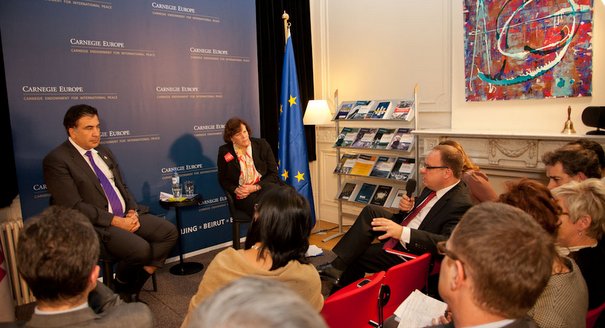Registration
You will receive an email confirming your registration.
Following a successful transition to democracy and a period of unprecedented growth, Georgia now serves as a model for democratic development. However, the country also faces substantial criticism concerning its respect for domestic civil liberties. Georgia now finds itself at a crossroad and the new government faces important decisions in the near future. Will it continue its path of democratization? Will it grow closer with the West? What are its prospects for future development?
To discuss these questions, Carnegie Europe hosted H.E. Mr. Mikheil Saakashvili, president of Georgia. Saakashvili, who was the youngest national president in Europe following his election in 2004, has been widely lauded for his willingness to accept his defeat in Georgia’s recent parliamentary election. Carnegie’s Jessica Tuchman Mathews moderated the discussion.
Highlights
- Relations with the West: Saakashvili explained that Georgians increasingly enjoy the benefits of an open, pluralistic, and democratic society, as well as closer relations with the West and the European Union in particular. No matter who leads the country, he said, Georgia will not deviate from the European path. Saakashvili also suggested that the new government continue the country’s efforts toward NATO membership. Asked as to how it was that he and prime minister Bidzina Ivanishvili were in Brussels on the same day with separate schedules, Saakashvili said, “I guess we will have to coordinate” in the future.
- Relations with Russia: Georgia’s relations with Russia are currently problematic and Saakashvili warned that the new government will face serious challenges in this field. He noted that Georgians generally value good relations with Russia, but also reiterated that a majority of Georgians do favor deeper integration with the West. Moreover, he added, Russia’s leverage in the region, which is mostly built on its energy exports, will decrease as other states tap new energy sources, especially shale gas.
- Rule of Law: Saakashvili stressed that significant progress had been made on tackling corruption and strengthening the judicial system in Georgia. When he entered office, Georgia was under severe international pressure, while now, he argued, it ranks among the least corrupt countries in Europe. However, he also voiced his dissatisfaction with the new government’s use of judicial measures, some of which were directed against former members of his government, after the transition. Asked if he regretted a series of arrests in 2004 of former officials from the administration of Eduard Shevardnadze that could now set a precedent for the new government, Saakashvili said there was a “big difference” in his government’s actions which had been aimed at clearing up corruption.
- Further Challenges: Saakashvili identified the development of a democratic culture as one of the major challenges for the new government. “One successful transition is not enough,” he said, urging the new government to equally respect democratic principles in the next elections. He asserted that the country is on the right path to building a functioning system of governance with the right checks and balances and an independent judiciary. But he also urged caution. He ruled out the possibility of an authoritarian backlash similar to the one in Russia, saying that “the benefits of freedom” cannot be taken away from the Georgian people. However, he stressed that the implementation of future policies should follow the proper rules of procedure.
